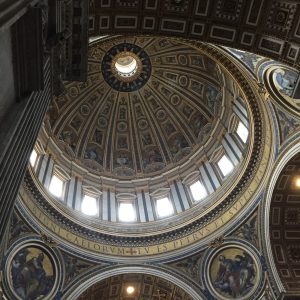Opplyst liv
What Now?
In a panel conversation moderated this evening by Francis X. Maier, Archbishop Salvatore Cordileone, Archbishop Paul Coakley, and I were asked ‘to offer our hopes and thoughts about what we need now as a Church in light of the new Leo pontificate, and the main opportunities and challenges the Church now faces.’ I proposed these introductory remarks:
So what do we need now? Like most bishops, I dare say, I am often presented, on trips around the diocese, with long lists of people’s perceived needs. I give these my attention; then try to suggest that the crucial question may not in fact be, ‘What do we need?’, but, ‘What are we needed for?’ A shocking aspect of Biblical faith is God’s preferential option for letting his providence unfold, for all his omnipotence, through fallible, weak, sinful human beings. How can we make ourselves mobilisable for his salvific, blessed purpose? This kind of consideration is what we need above all.
Were I, next, to be more specific, I’d hone in on a need I’d call hermeneutic. Let me explain. As a student of monastic history I have noticed that a predictable crisis occurs in the life of a community when the reins of government pass from the second to the third generation. The founders set about their task with clear purpose and the exhilaration of starting something new. The second generation positions itself in relation to the founders. Some will adulate them, some will be more critical; but the founders’ experience, direction, and vision remain, for better or for worse, a criterion of collective discernment. This dynamic changes at the next generational juncture, by which time the founders will be dead, or quite ancient. All of a sudden the second generation’s search for particular identity seems like much ado about not very much. The truly pressing issues are more fundamental: ‘What are we all about? How can we find our place within a tradition that transcends us? Are we on the right track?’ The third generation is faced with the challenge of continuity. To carry on faithfully it needs more than the history — or myth — of heroic origins. It must at once integrate and relativise its specific heritage, looking forward as well as back, up, not down.
This dynamic touches the universal Church, I believe, with regard to a modern event that may be called foundational, so deeply has it formed Catholic experience. I refer, of course, to the Second Vatican Council. What the council represented to those who knew a before and an after has been documented amply and polyphonically. Afterwards came the labours of those who were, or saw themselves as, the council’s legitimate heirs. There were splendid initiatives; but we know no less what quarrels emerged, locking Catholic discourse in confrontations between so-called ‘liberal’ and ‘conservative’ positions, unedifying clashes — and almost invariably dull.
Something of the climate of the second generation found symbolic expression in a teacup storm not all that long ago when it was still a subject of debate whether Vatican II might best be approached through a hermeneutic of rupture or one of continuity. I confess I found this querelle perplexing. I cannot see how any Catholic might adopt anything but a hermeneutic of continuity. This perspective is inherent in our faith in a God who acts in history, who exhorts us, ‘Remember!’, whose incarnate Son is the principle by which and for which all things exist, whose Spirit sanctifies, in Christ, by ‘calling to mind’.
The collective remembrance of what the council and its aftermath felt like has faded. That notably reduces the emotional heat of hermeneutic exercise, enabling lucid reflection. Today’s young Catholics are not ungrateful for the council’s great gifts, but unable to proceed with their grandparents’ mindsets, uninclined to flog dead horses, unenthused by fossilised projects of aggiornamento when the sun has set on the giorno by which they were defined. What they long for is to awaken the dawn, to know the saving power of Christ, the same today, yesterday, and always, yet making all things new, often enough by exploding time-bound dichotomies.
The pontificate of Leo XIV will guide us peacefully, I expect, into this new era, full of promise. There is a joy in the air. It gives me confidence; for joy, the genuine stuff, not the counterfeit, is a sign that something goes on in us not of our making, something enabling us to seek wholeness in the midst of apparent fragmentation. I think of something the Holy Father said recently, in a catechesis on Saint Irenaeus:
The doctrinal divisions [Irenaeus] encountered within the Christian community, the internal conflicts and external persecutions, did not discourage him. On the contrary, in a fragmented world he learned how to think better, bringing his attention ever more deeply to Jesus. He became a cantor of his person, indeed of his flesh. He recognised that in [Jesus], what seems to conflict is reconciled in unity. Jesus is not a wall that separates, but a door that unites us. We have to remain in him and distinguish reality from ideologies.
I am drawn by this papal challenge to ‘think better’ and by the counsel that so to think is to think ‘in Christ’, who is Truth, thereby to distinguish the real from the unreal. Surrounded as we are more than ever by illusions, that is a further thing we do need now.
Thank God that Peter, rock-firm, is there to confirm us, his brethren.

